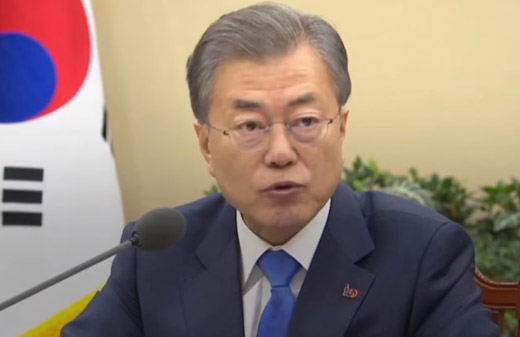Analysis by WorldTribune Staff, December 3, 2021
As the reign of South Korean leftist President Moon Jae-In approaches its end with scant accomplishments, so-called “Sunshiners” have moved to salvage what they can of the Moon regime by drafting a “peace declaration” to end the Korean War.
“The goal is to rope the U.S. in,” Nicholas Eberstadt wrote in a Nov. 28 analysis for the Wall Street Journal.

It would be a declaration of peace without actual peace, analysts say.
According to media reports out of Seoul, Team Biden has been going along with the charade. And the Chinese Communist Party (CCP) is hailing it.
Yang Jiechi, a member of the CCP’s Politburo, delivered China’s support for the declaration during a meeting with Suh Hoon, director of national security at Cheong Wa Dae who serves as Moon’s national security adviser.
Yang was quoted as saying: “(We) support the push for the end-of-war declaration and believe that the end-of-war declaration will contribute to promoting peace and stability on the Korean Peninsula.”
Yang, China’s most senior foreign policy official, and Suh also reaffirmed the two sides will seek Chinese dictator Xi Jinping’s visit to South Korea as soon as the situations related to the Covid-19 pandemic are “stabilized.”
“Washington has said little publicly about the initiative, but Sunshiners in the South, who have been pressing it on (Joe) Biden since his inauguration, claim a joint U.S.-South Korea end-of-war declaration is in its ‘final stages,’ ” Eberstadt noted. “Let’s hope the reports are wrong. Pantomime statecraft and make-believe breakthroughs can’t enhance Korean security — though they could very well make the peninsula a more dangerous place.”
WorldTribune.com contributing editor Donald Kirk concurred, noting “the next step after an end-of-war agreement would be a ‘peace treaty’ calling for withdrawal of all foreign troops and bases. North Korea, while loudly demanding the Americans make sweeping concessions, would not agree on reducing its own forces, pulling back thousands of artillery pieces trained on the South and cancelling its nuclear program.”
The Chinese “would always be there, just above North Korea, ready to send in troops as in 1950. Without the backup of U.S. forces and bases, the South would be in greater danger than at any time since the Korean War,” Kirk noted.
As Moon nears the end of his five-year term in May, he “would like nothing better than to step down with his name inscribed on a declaration” co-signed by Kim Jong-Un and Joe Biden “or at least by their negotiators declaring a formal end to the Korean War,” Kirk wrote.
In 2007, in what Eberstadt noted was an “earlier era of Blue House Sunshine,” then-President Roh Moo-Hyun and North Korean dictator Kim Jong-Il signed a joint statement in Pyongyang resolving, among other things, to “put an end to military hostilities, mitigate tensions and guarantee peace on the Korean Peninsula.”
But “North-South peace didn’t materialize,” Eberstadt noted. “Instead, the Kim regime went on to sink a South Korean military vessel, shell civilians on a South Korean island near the Northern Limit Line, set off five atomic devices, and launch vast numbers of short- and long-range offensive missiles.”
INFORMATION WORLD WAR: . . . . How We Win . . . . Executive Intelligence Brief
